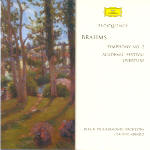This 1971 Brahms Second reveals the consistency of the Berlin Philharmonic’s playing style in this work. In terms of orchestral timbre, it sounds pretty much the same as in Karajan’s last recording from 1987, with brass-dominated textures (especially the trombones) and shining string tone. However, Karajan’s performance is a miracle of his particular type of seamless phrasing and blended sonority–you can scarcely believe human beings are playing these instruments. Claudio Abbado’s reading is more down-to-earth, with measured tempos (in the heartfelt first movement) and traditional gestures (the lush second and cultivated third). It’s quite fine, really. Still, I turn to Bruno Walter for the ultimate in old-world charm, and for stunning orchestral virtuosity there’s Solti with Chicago and Dohnanyi with Cleveland. (Abbado himself made an excellent newer recording, again with Berlin, just a few years ago). The coupled Academic Festival overture actually sounded exciting enough to hold my interest, a remarkable achievement. DG’s recording is a bit cavernous, but with plenty of detail and impact.
































